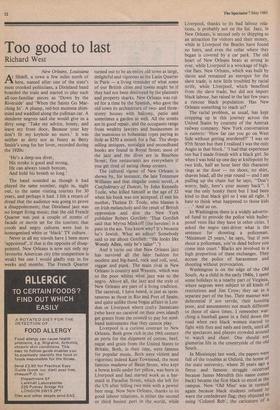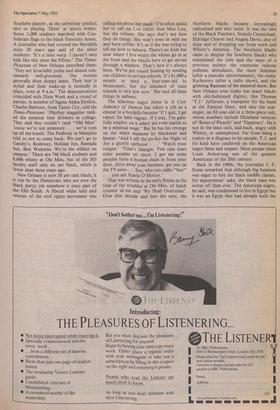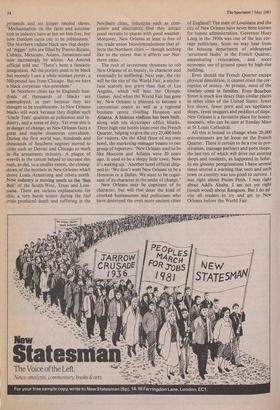Too good to last
Richard West
New Orleans, Louisiana ASlidell, a town a few miles north of here, named after one of the state's most crooked politicians, a Dixieland band boarded the train and started to play such all-too-familiar pieces as 'Down by the Riverside' and 'When the Saints Go Mar- ching In'. A plump, red-hot momma shim- mied and waddled along the pullman car. A slenderer negress said she would give us a dirty song: 'Take my advice, honey, and leave my front door, Because your key don't fit my keyhole no more.' It was neither as dirty nor as funny as Betty Smith's song for her lover, recorded during the 1920s:
'He's a deep-sea diver, His stroke is good and strong, He can always touch bottom, And hold his breath so long,' The band sounded as though it had played the same number, night in, night out, to the same visiting tourists for 30 years, and perhaps it had. I felt a return of dread that the audience was going to prove a disappointment; that Dixieland jazz was no longer living music; that the old French Quarter was just a couple of streets of facade or movie set for the tourists; that creole and negro cultures were lost in homogenised white or 'black' TV culture.
Never in all my travels have I been more 'appointed', if that is the opposite of disap- pointed. New Orleans is now not only my favourite American city (the competition is weak) but one I would gladly stay in for weeks and months. The French Quarter turned out to be an entire old town as large, delightful and vigorous as the Latin Quarter in Paris — a living reminder of what some of our British cities and towns might be if they had not been destroyed by the planners and property sharks. New Orleans was rul- ed for a time by the Spanish, who gave the old town its architecture of two- and three storey houses with balcony, patio and sometimes a garden as well. All the streets are in good repair, and the occupants range from wealthy lawyers and businesmen in the mansions to bohemian types paying as little as $250 a month for a flat. The shops selling antiques, nostalgia and secondhand books are found in Royal Street; most of the jazz and the dives are in Bourbon Street; fine restaurants are everywhere if you get tired of eating cheap oysters.
The cultural vigour of New Orleans is shown by, for instance, the late Tennessee Williams and that singular comic novel, A Confederacy of Dunces, by John Kennedy Toole, who killed himself at the age of 32 when his book was not accepted. (I met his mother, Thelma D. Toole, who blames it on Irish melancholy and the result of British oppression and also the New York publisher Robert Gottlieb: 'That Gottlieb said that Myrna Minkoff [the heroine] is a pain in the ass. You know why? It's because he's Jewish. What an editor! Somebody said to me about Gottlieb: "He looks like Woody Allen, only he's taller".')
And it turns out that New Orleans jazz has survived all the later fashion for modern and big-band, rock and roll, soul, reggae and plink. The main rival in New Orleans is country and Western, which was to the poor whites what jazz was to the negro. Above all, the jazz and the style of New Orleans are part of a living tradition. The carnival, I have heard, is just as spon- taneous as those in Rio and Port of Spain; and quite unlike those bogus affairs in Lon- don or Liverpool where crafty Jamaicans (who have no carnival on their own island) get grants from the council to pay for steel- band instruments that they cannot play.
Liverpool is a curious contrast to New Orleans. Both grew rich in the 19th century as ports for the shipment of cotton, beef, sugar and grain from the United States to Britain. Both, in their time, were famous for popular music. Both were violent and vigorous; indeed Kate Townsend, the most famous madame of Basin Street, who kept a bowie knife under her pillow, was born in Liverpool and had started work as a bar- maid in Paradise Street, which she left for the US after felling two men with a pewter beer mug. Now New Orleans, thanks to its good labour relations, is either the second or third busiest port in the world, while
Liverpool, thanks to its bad labour rela- tions, is probably not on the list. Jazz, in New Orleans, is second only to shipping as an attraction for visitors and their money, while in Liverpool the Beatles have found no heirs, and even the cellar where they began is covered by a car park. The old heart of New Orleans beats as strong as ever, while Liverpool is a wreckage of high- rise flats. New Orleans, which was built by slaves and remained an entrepot for the slave trade, is now little troubled by racial strife, while Liverpool, which benefited from the slave trade, but did not import black labour, has raised in the last few years a riotous black population. Has New Orleans something to teach us?
The racial problem, as usual, has kept cropping up in this journey across the United States by courtesy of the Amtrak railway company. New York conversation is esoteric: 'How far can you go on West Side without getting murdered?' I was on 97th Street but then I realised I was the only Anglo in that block.' I had-that experience too but I made friends with a black girl. So when I was held up one day at knifepoint by two kids, half an hour later this character rings at the door — no shoes, no shirt, shaven head, all the year round — and I am pulling up the chain but he says, "Don't worry, lady, here's your money back". I was the only honky there but I had been kind to that black girl so I was all right. I hate to think what happened to those kids . . .' And so on.
In Washington there is a widely advertis- ed fund to provide the police with bullet- proof vests like they have in other cities. I asked the negro taxi-driver what is the sentence for shooting a policeman. 'Minimum 25 years,' he says, 'but if you shoot a policeman, you're dead before you come into court.' Blacks are involved in a high proportion of these exchanges, They accuse the police of harassment and shooting without provocation.
Washington is on the edge of the Old South. As a child in the early 1940s, I spent some holidays in a nearby part of Virginia, where negroes were subject to all kinds of restrictions and Jim Crow; they sat in a separate part of the bus. Their manner was deferential if not servile, their housing poor, and amusements not much different to those of slave times. I remember wat- ching a baseball game in a field down the road when two black women started to fight with fists and nails and teeth, until all the spectators and players crowded around to watch and cheer. One should not glamorise life in the countryside of the old South.
In Mississippi last week, the papers were full of the troubles at Oxford, the home of the state university, where 20 years ago a fierce and famous struggle occurred because James Meredith (his name comes back) became the first black to enrol at the campus. Now 'Old Miss' was in turmoil again because black students refused to wave the confederate flag; they objected to using 'Colonel Reb', the caricature of a
Southern planter, as the university symbol; also to playing 'Dixie' at sports events. Some 1,000 students marched with Con- federate flags to the black fraternity house. A journalist who had covered the Meredith story 20 years ago said of the white students: 'It's a time warp. I haven't seen kids like this since the Fifties.' The Times- Picayune of New Orleans described them: 'They are invariably polite and almost con- sistently well-groomed. The women generally shun sloppy jeans. Their hair is styled and their make-up is formally in place, even at 9 a.m.' The demonstrations coincided with Dixie Week and a round of parties. A member of Sigma Alpha Epsilon, Charles Harbour, from Yazoo City, told the Times-Picayune: 'Playboy magazine rank- ed the amateur beer drinkers in college. They said they couldn't rank "Old Miss" 'cause we're not amateurs . . . we've torn up all the hotels. The Peabody in Memphis told us not to come back. We can't go to Gatsby's, Rodeway, Holiday Inn, Ramada Inn, Best Westerns. We're the wildest on campus.' There are 746 black students and 8,666 whites at Ole Miss, but of the 503 faculty staff only six are black, which is fewer than three years ago.
New Orleans is now 50 per cent black; it is run by the Democrats who are now the black party; yet somehow it stays part of the Old South. A liberal white lady and veteran of the civil rights movement was telling me about her maid: 'I've often asked her to call me Lou rather than Miss Lou, but she refuses. She says that's not how they do things. She won't even sit with me and have coffee. It's as if she was trying to tell me how to behave. There's an Irish bar near where I live where the whites go in at the front and the blacks have to get served through a window. That's how it's always been. We've got round bussing by sending our children to private schools. It's $1,000 a month to send a four-year-old to Montessori, but the standard of state schools is very low now.' She said all these things in sadness.
The hilarious negro Jones in A Con- federacy of Dunces has taken a job as a cleaner in a bordello because 'If I quit, I get report for bein vagran. If I stay, I'm gain- fully employ on a salary ain even startin to be a minimal wage.' But he has his revenge on the white madame by blackmail and banter: 'And I tell the po-lice the Night of Joy a glorify cathouse . . ."Watch your tongue.' Time's changin. You cain scare color peoples no more. I got me some peoples form a human chain in front your door, drive away your business, get you on the TV news . . . Say, who you callin "boy" . . . you ain Scarla O' Horror.'
That was written in the early Sixties at the time of the troubles at Ole Miss, of lunch counter sit-ins and 'We Shall Overcome'. Over that decade and into the next, the Northern blacks became increasingly radicalised and also racist. It was the time of the Black Panthers, Stokely Carmichael, Eldridge Cleaver and Angela Davis; also of dope and of dropping out from work and Whitey's America. The Northern blacks came to despise the Southern blacks who maintained the jobs and the ways of a previous society: the courteous redcoat pullman attendants, the Aunt Jemimas (after a pancake advertisement), the comic Rochesters (after a radio show), and the grinning Rastuses of the minstrel show.. But New Orleans even today has many blacks with old-fashioned dignity, like Thomas 'T.J.' Jefferson, a trumpeter for his band at the Famous Door, and also the scat- singer, an 82-year-old in a three-piece suit, whose numbers include Dixieland versions of 'Roses of Picardy' and 'Tipperary'. He is not in the least cool, laid-back, angry with Whitey, or unemployed. Far from being a traitor or a disgrace to his people, T.J. and his kind have conferred on the American negro fame and respect. Most people think Louis Armstrong one of the greatest Americans of the 20th century.
Back in the 1960s, the journalist I. F. Stone remarked that although big business was eager to hire the black middle classes, for appearances' sake, the black man was worse off than ever. The American negro, he said, was condemned to live in Egypt but it was an Egypt that had already built the pyramids and no longer needed slaves. `Mechanisation on the farm and automa- tion in industry have at last set him free, but now freedom turns out to be joblessness.' The Northern radical black saw that despis- ed 'nigger' jobs are filled by Puerto Ricans, Cubans, Mexicans, Asians, Jamaicans.and now increasingly by whites. An Amtrak official told me: 'There's been a fantastic integration. All the porters used to be black but recently I saw a white woman porter, a 300-pound lass from Chicago. But we have a black corporate vice-president.'
In Northern cities (as in England) hun- dreds of thousands of blacks are unemployed, in part because they are thought to be troublesome. In New Orleans blacks still work because they display such `Uncle Tom' qualities as politeness and in- dustry, and a sense of duty. Yet even this is in danger of change, as New Orleans faces a great and maybe disastrous convulsion. During the first world war, hundreds and thousands of Southern negroes moved to cities such as Detroit and Chicago to work in the armaments industry. A plague of weevils in the cotton helped to increase this rush, as did, to a smaller extent, the closing- down of the brothels in New Orleans which drove Louis Armstrong and others north. Now industry is moving south to the 'Sun Belt' of the South-West, Texas and Loui- siana. There are various explanations for this: a very harsh winter during the fuel crisis produced death and suffering in the
Northern cities; industries such as com- puters and electronics find they attract good recruits to places with good weather. Moreover, New Orleans at least is free of the trade union bloodymindedness that af- fects the Northern cities — though nothing like to the extent that it affects our Nor- thern cities.
The rush of investment threatens to rob New Orleans of its beauty, its character and eventually its wellbeing. Next year, the city will be the site of the World Fair, a misfor- tune scarcely less grave than that of Los Angeles, which will host the Olympic Games. And when the World Fair has gone by, New Orleans is planned to become a convention centre as well as a regional business centre rivalling Houston and Atlanta. A hideous stadium has been built, along with ten skyscraper office blocks. Three high-rise hotels loom over the French Quarter, helping to give the city 25,000 beds for visitors. On the 42nd floor of my own hotel, the marketing manager boasts to our group of reporters: 'New Orleans used to be like Houston and Atlanta were 20 years ago. It used to be a sleepy little town. Now it's waking up.' Another hotel official chip- ped in: 'We don't want New Orleans to be a Houston or a Dallas. We want to be cogni- sant of its character in the midst of change.'
New Orleans may be cognisant of its character, but will that deter the kind of crooked businessmen and politicians who have destroyed the even more ancient cities of England? The state of Louisiana and the city of New Orleans have never been known for honest administration. Governor Huey Long in the 1930s was one of the less cor- rupt politicians. Soon we may hear from the housing department of widespread `structural faults' in the French Quarter, necessitating renovation, and more economic use of ground space by high-rise building.
Even should the French Quarter escape physical demolition, it cannot resist the cor- ruption of money. At present, most of the tourists come in families. Even Bourbon Street is much less sleazy than similar places in other cities of the United States: fewer live shows, fewer porn and sex appliance shops, fewer muggers and peddlers of dope. New Orleans is a favourite place for honey- mooners, who can be seen at Sunday Mass at St Louis Cathedral.
All this is bound to change when 20,000 conventioners are let loose on the French Quarter. There is certain to be a rise in pro- stitution, massage parlours and porn shops, the last two of which will drive out existing shops and residents, as happened in Soho. In my gloomy peregrinations I have several times uttered a warning that such and such town or,country was too good to survive. I was right about Pnom Penh. I was right about Addis Ababa. I am not yet right (touch wood) about Rangoon. But I do ad- vise all readers to try and get to New Orleans before the World Fair.












































 Previous page
Previous page